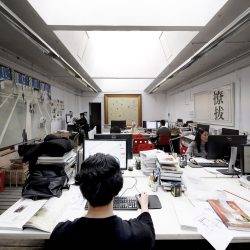January 24, 2018
Majority of global business leaders believe world economy will grow this year
 Well over half (fifty seven percent) of business leaders say they believe global economic growth will improve in the next 12 months – almost twice (29 percent) the level of results from the annual survey carried out by PwC . Launched at the World Economic Forum Annual Meeting in Davos, the survey found that optimism in the economy is feeding into CEOs’ confidence about their own companies’ outlook. As 42 percent of CEOs said they are “very confident” in their own organisation’s growth prospects over the next 12 months, up from 38 percent last year. Looking at the results by country though, it’s a mixed bag. In the UK, with Brexit negotiations only recently reaching a significant milestone, business leaders’ drop in short-term confidence is unsurprising (2018: 34 percent vs. 2017: 41 percent). The survey also found that CEOs are determined to find the right talent needed to reap the benefits of the digital disruption, with investments in modern working environments and the establishment of learning and development programmes to help attract and develop digital talent.
Well over half (fifty seven percent) of business leaders say they believe global economic growth will improve in the next 12 months – almost twice (29 percent) the level of results from the annual survey carried out by PwC . Launched at the World Economic Forum Annual Meeting in Davos, the survey found that optimism in the economy is feeding into CEOs’ confidence about their own companies’ outlook. As 42 percent of CEOs said they are “very confident” in their own organisation’s growth prospects over the next 12 months, up from 38 percent last year. Looking at the results by country though, it’s a mixed bag. In the UK, with Brexit negotiations only recently reaching a significant milestone, business leaders’ drop in short-term confidence is unsurprising (2018: 34 percent vs. 2017: 41 percent). The survey also found that CEOs are determined to find the right talent needed to reap the benefits of the digital disruption, with investments in modern working environments and the establishment of learning and development programmes to help attract and develop digital talent.







 The UK has been ranked as the eighth best country in the world for the ability to attract, retain, train and educate skilled workers, but while its ability to leverage diversity for talent competitiveness is boosted by its global knowledge skills – the UK is undermined by its weaker performance on tolerance and gender equality. According to the Global Talent Competitiveness Index GTCI) produced by the Adecco Group, with international business school INSEAD and Tata Communications, the UK has a particularly strong pool of global knowledge skills, a variable for which it is ranked third in the index boosted further by its strong regulatory, market and business landscape. But this is undermined by its internal openness, where it still lags behind, especially when it comes to gender equality. The report also suggests that although Article 50 was triggered in 2017, the ongoing negotiations and continuing lack of clarity over the UK’s position once it leaves the European Union in 2019, means the impact of Brexit is not yet clear.
The UK has been ranked as the eighth best country in the world for the ability to attract, retain, train and educate skilled workers, but while its ability to leverage diversity for talent competitiveness is boosted by its global knowledge skills – the UK is undermined by its weaker performance on tolerance and gender equality. According to the Global Talent Competitiveness Index GTCI) produced by the Adecco Group, with international business school INSEAD and Tata Communications, the UK has a particularly strong pool of global knowledge skills, a variable for which it is ranked third in the index boosted further by its strong regulatory, market and business landscape. But this is undermined by its internal openness, where it still lags behind, especially when it comes to gender equality. The report also suggests that although Article 50 was triggered in 2017, the ongoing negotiations and continuing lack of clarity over the UK’s position once it leaves the European Union in 2019, means the impact of Brexit is not yet clear.


 Managers are working an extra 44 days a year over and above their contracted hours, up from 40 days in 2015. These long hours are taking their toll, causing a surge in sick leave amongst managers suffering from stress and mental ill health, claims the Chartered Management Institute (CMI), which is calling on UK employers to provide greater support. Long hours and constant communication are having a detrimental effect on the wellbeing of managers it argues resulting in one in ten managers taking time off for mental health in the last year, and for those who do take time out, it’s for an average of 12 days. Of the 1,037 managers surveyed for the report, the average boss puts in an extra day each week. This is an extra 7.5 hours beyond their contracted weekly hours (44.4 hours actual compared to 37.3 contracted), adding up to an extra 43.8 days over the course of the year. This is up from 39.6 days in 2015. The rising gap between contracted and actual hours of work is in addition to an ‘always on’ digital culture, with 59 percent of managers saying they ‘frequently’ check their emails outside of work – up from 54 percent in 2015.
Managers are working an extra 44 days a year over and above their contracted hours, up from 40 days in 2015. These long hours are taking their toll, causing a surge in sick leave amongst managers suffering from stress and mental ill health, claims the Chartered Management Institute (CMI), which is calling on UK employers to provide greater support. Long hours and constant communication are having a detrimental effect on the wellbeing of managers it argues resulting in one in ten managers taking time off for mental health in the last year, and for those who do take time out, it’s for an average of 12 days. Of the 1,037 managers surveyed for the report, the average boss puts in an extra day each week. This is an extra 7.5 hours beyond their contracted weekly hours (44.4 hours actual compared to 37.3 contracted), adding up to an extra 43.8 days over the course of the year. This is up from 39.6 days in 2015. The rising gap between contracted and actual hours of work is in addition to an ‘always on’ digital culture, with 59 percent of managers saying they ‘frequently’ check their emails outside of work – up from 54 percent in 2015.




 The proportion of flexible space within occupier portfolios will continue to increase in 2018; a growing adoption of technology will redefine buildings, workplaces and portfolios; and it will be a year of decision for many businesses regarding Brexit. These are among the ‘UK Property Predictions 2018’ report from JLL which covers a range of different topics, with a particular focus on UK corporate occupiers. The report claims that traditional static portfolio concepts are being redesigned to incorporate new formats of space, co-working and a more fluid and diverse range of space options that support creativity, innovation and collaboration.
The proportion of flexible space within occupier portfolios will continue to increase in 2018; a growing adoption of technology will redefine buildings, workplaces and portfolios; and it will be a year of decision for many businesses regarding Brexit. These are among the ‘UK Property Predictions 2018’ report from JLL which covers a range of different topics, with a particular focus on UK corporate occupiers. The report claims that traditional static portfolio concepts are being redesigned to incorporate new formats of space, co-working and a more fluid and diverse range of space options that support creativity, innovation and collaboration. 









December 19, 2017
We need to have an honest conversation about presenteeism
by Steve Brewer • Comment, Flexible working, Workplace design
We have talked before about the risks of over thinking problems. It is not just something that consultants, designers and the workplace intelligentsia are guilty of – everyone does it. It is why we do not switch off when we are ill and still insist on going to work. We over think the consequences of not being in our workplace. Likewise, many traditional line managers simply cannot get their head around their teams working from home. After all, modern management mantras all talk about creating a great atmosphere in which teams all work together – in the same space at the same time? We all tend to over complicate most things and that is one of the main reasons in the UK we struggle with the concept of working from home. A consequence of this is the rise in presenteeism, which is mainly linked to illness, people ignoring how bad they feel and because of a perceived pressure, still turning up for work.
(more…)